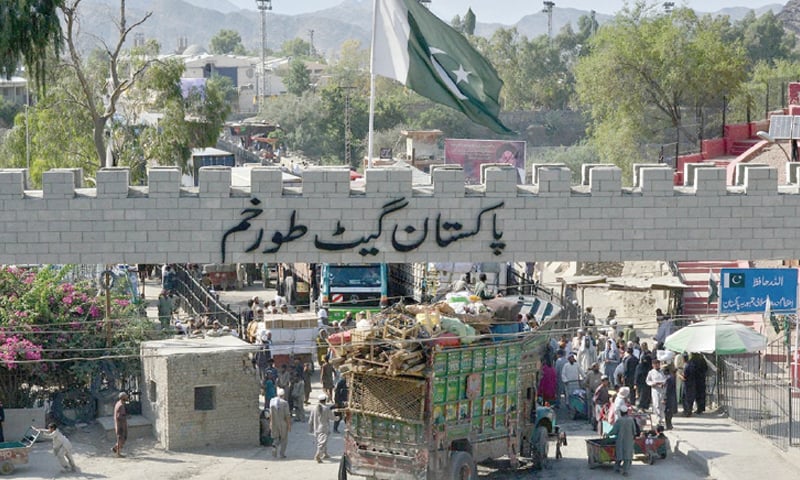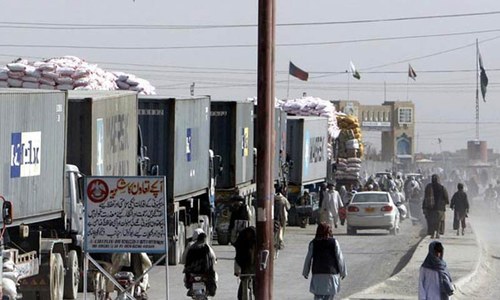ISLAMABAD: Pakistan is regaining its share in the Afghan transit trade as flow of cargoes rose 43.95 per cent to 93,732 containers in 2018-19 from 60,516 containers in the preceding year, official data showed.
The assessed import value of the transit cargoes also grew a robust 54.88pc to $5.715 billion in 2018-19 from $3.97bn a year earlier.
The flow of containers, which were 75,288 in 2009-10, fell significantly after the implementation of the new transit treaty in June 13, 2011. Many experts believe that Afghanistan diverted transit trade to Iran and India as both countries have developed infrastructure in and around the Iranian ports of Chabahar and Bandar Abbas.
The sudden rise in the overall transit cargo shows a mixed trend. The shipments include commercial, non-commercial and US/ISAF cargoes. The growth trend in these cargo flows also saw deep fluctuations at the exit border stations of Torkham and Chaman.
The data show that the flow of transit containers at Torkham grew a paltry 9.7pc to 39,175 in 2018-19 from 35,699 in the previous year. The assessed import value of cargo at Torkham reached to $2.63bn during the year under review as against $2.23bn over the previous year, showing an increase of 17.9pc.
Chaman crossing emerges as a favoured route for cargo movement
Traditionally, Torkham in Khyber Pakhtunkhwa was one of leading border point for cargo movement. However, a slowdown was noticed in the commercial cargoes during the outgoing fiscal year.
The flow of commercial containers grew by 4.6pc to 37,202 in 2018-19 from 35,564 a year ago. In value terms, the growth was recorded at $2.44bn as against $2.22bn over the last year, reflecting a growth of 10pc.
The drop in commercial containers at Torkham border is believed to have been one of the outcomes of the fencing of border with Afghanistan as it has become difficult for smugglers to re-enter transit goods in KP areas. However, there is no official confirmation for this.
The only justification in support of this argument is the substantial increase in the commercial containers which grew by over 90pc in just one year at the Chaman border. This diversion shows that transit importers have chosen Chaman as a new destination until the fencing is complete in the Balochistan province.
Talking to Dawn, a customs officer said that those who deal in transit trade have complained about the strict implementation of axle load condition implemented by the National Highway Authority (NHA). The traders believe that NHA implementation of the measures is stricter in KP and not in Balochistan which leads to diversion.
The flow of US/ISAF containers reached 1,178 at Torkham in 2018-19 from 93 in the previous year, showing a massive increase of 1,166pc.
Similar growth was seen in containers of non-commercial containers which are mostly used by the Afghan government, non-government organisations and embassies stationed in Afghanistan.
Contrary to this, the flow of total transit cargoes at Chaman reached to 51,641 containers in 2018-19 as against 24,817 containers in the previous year, showing an increase of 108pc. This growth is mainly the outcome of the increase in commercial cargoes at Chaman station which rose by 90.5pc to 45,463 in 2018-19 from 23,864 in the previous year. In value terms, the assessed import value of these containers reached to $2.397bn as against $893m in the previous year, showing an increase of 168.4pc.
The US/ISAF containers at Chaman station fell to 591 in 2018-19 from 953 in the previous year, showing a decline of 37.9pc. Similar trend was seen in non-commercial cargoes at Chaman station. All these figures show that Chaman has emerged a favourite destination for commercial importers in the outgoing fiscal year.
On the basis of this data, the official believes that another serious area for the government to control smuggling of goods would be the coastal belt in Balochistan.
Pakistan has allowed 75pc of Afghan transit consignments through green channel immediately upon filing of goods declaration. Of the remainder, 20pc cargo requiring scanning will be cleared in two days and 5pc in three days.
Meanwhile, Federation of Pakistan Chambers of Commerce and Industries (FPCCI) President Daroo Khan Achakzai told Dawn that the facilitation measures adopted by Pakistan government will further increase transit trade.
He also stressed on the need to implement Afghanistan Pakistan Transit Trade Agreement (APTTA) in true letter and spirit. The FPCCI president further pointed out that Pakistan can play an instrumental in ensuring Afghanistan’s food security.
Published in Dawn, September 29th, 2019














































